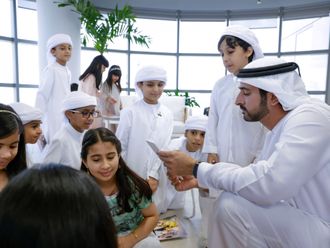Warsa: A delegation from the UAE headed by Dr Sultan Ahmad Al Jaber, UAE Minister of State and Special Envoy for Energy and Climate Change, participated in the Conference of Parties (COP) 19 meeting on climate change, held in Warsaw, Poland.
Dr Al Jaber reinforced the UAE’s commitment to effectively address climate change when meeting UN Secretary General Ban Ki-moon. They also discussed the future of international climate policy and new avenues of collaboration between the UAE and UN focused on ongoing and pressing world challenges.
COP19 is this year’s annual meeting of the United Nations Framework Convention on Climate Change (UNFCCC). It is the first meeting in a process to develop a new legally binding climate agreement by 2015.
The UAE delegation’s participation was underscored by Dr Al Jaber’s address during the COP Plenary’s High Level session, which highlighted the UAE’s tangible achievements towards climate change mitigation and stressed the importance of an effective international response.
“The UAE is committed to addressing climate change from an economic, social and environmental point of view,” said Dr Al Jaber. “Our growing experience includes implementing commercial clean energy projects, making investments into clean technologies, and also expanding our development assistance by making clean energy accessible to all.
“As a global community, we are responsible for taking the necessary steps to achieve sustainable economic growth while safeguarding our environment. Achieving this will require capitalising on immediate opportunities available through the UNFCCC process such as swiftly enacting the Green Climate Fund to channel finance to developing countries, and ensuring the effective operation of the new climate technology mechanism to enable technology development and exchange,” added Dr Al Jaber.
In recent years, the UAE has rapidly emerged as a leading investor in clean energy technologies. In 2013 alone the UAE successfully inaugurated a number of projects including Shams 1, the 100MW solar plant in Abu Dhabi; the 13MW solar plant in Dubai; and the 630MW London Array offshore wind farm in the United Kingdom.
While the UAE is investing in new sources of energy that are contributing to curbing greenhouse gas emissions, it is also proactively decarbonising its economy through the application of cutting-edge carbon capture technology.
Earlier this month the Abu Dhabi National Oil Company (Adnoc) and Masdar launched the Middle East’s first carbon capture use and storage (CCS) project in Abu Dhabi. The region’s pioneering CCS project will capture 800,000 tonnes of carbon dioxide per year from a steel manufacturing facility for enhanced oil recovery in Adnoc’s oil fields prior to storing the carbon dioxide permanently underground.
The UAE has also championed international collaboration; bringing world leaders, businesses and academics together on clean energy and sustainable development through the Abu Dhabi Sustainability Week (ADSW). ADSW and its participating events — the World Future Energy Summit, the International Water Summit, the Zayed Future Energy Prize and EcoWaste — help catalyse innovative solutions to our energy, water and sustainability challenges.












